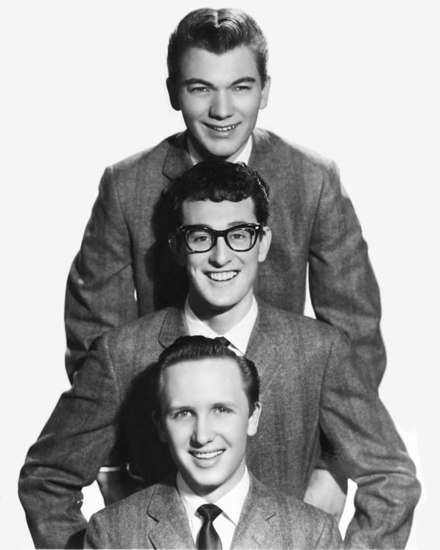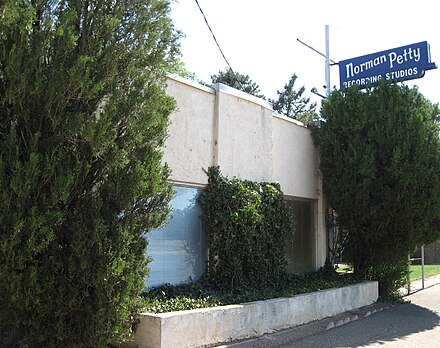Charles Hardin Holley (September 7, 1936 – February 3, 1959), known professionally asBuddy Holly, was an American singer-songwriter and a pioneer of rock and roll. Although his success lasted only a year and a half before his death in an airplane crash, Holly is described by critic Bruce Eder as "the single most influential creative force in early rock and roll. His works and innovations inspired and influenced contemporary and later musicians, notably the Beatles, Elvis Costello, the Rolling Stones, and Bob Dylan, and exerted a profound influence on popular music. In 2004, Rolling Stone magazine ranked Holly number 13 on its list of the 100 greatest artists of all time.
Holly saw Elvis Presley sing in Lubbock in 1955, and began to incorporate a rockabilly style, similar to the Sun Records sound, which had a strong rhythm acoustic and slap bass.On October 15, 1955, Holly, along with Bob Montgomery and Larry Welborn, opened the bill for Presley in Lubbock, catching the eye of a Nashville talent scout. Holly's transition to rock continued when he opened for Bill Haley & His Comets at a local show organized by Eddie Crandall, the manager for Marty Robbins.
Decca Records signed him to a contract in February 1956, following this performance, misspelling his name as "Holly". He thereafter adopted the misspelled name for his professional career. Holly formed his own band, later to be called The Crickets, consisting of Holly (lead guitar and vocals), Niki Sullivan (guitar), Joe B. Mauldin (bass), and Jerry Allison(drums). They went to Nashville for three recording sessions with producer Owen Bradley. However, Holly chafed under a restrictive atmosphere that allowed him little input. Among the tracks he recorded was an early version of "That'll Be The Day", which took its title from a line that John Wayne's character says repeatedly in the 1956 film The Searchers. This initial version of the song was played more slowly and about half an octave higher than the later hit version. Decca released two singles, "Blue Days, Black Nights" and "Modern Don Juan", that failed to make an impression. On January 22, 1957, Decca informed Holly his contract would not be renewed, insisting, however, that he could not record the same songs for anyone else for five years.
Holly then hired Norman Petty as manager, and the band began recording at Petty's studios in Clovis, New Mexico. Petty contacted music publishers and labels, and Brunswick Records, a subsidiary of Decca, signed the Crickets on March 19, 1957. Holly signed as a solo artist with another Decca subsidiary, Coral Records. This put him in the unusual position of having two recording contracts at the same time.[12]
On May 27, 1957, "That'll Be The Day" was released as a single, credited to the Crickets to try to bypass Decca's claimed legal rights. When the song became a hit, Decca decided not to press its claim. "That'll Be the Day" topped the Billboard US "Best Sellers in Stores"chart on September 23, and was No. 1 on the UK Singles Chart for three weeks in November. The Crickets performed "That'll Be the Day" and "Peggy Sue" on The Ed Sullivan Show on December 1. They also sang "Peggy Sue" on The Arthur Murray Party on December 29 and were given a polite introduction by Kathryn Murray. The kinescopes of these programs are the only record of their 1957 television appearances.
Holly helped win over an all-black audience to rock and roll/rockabilly when the Crickets were booked at New York's Apollo Theater for August 16–22, 1957. Unlike the immediate acceptance shown in the 1978 movie The Buddy Holly Story, it actually took several performances for the audience to warm up to him. In August 1957, the Crickets were the onlywhite performers on a national tour including black neighborhood theaters.[7]
As Holly was signed both as a solo artist and a member of the Crickets, two debut albums were released: The "Chirping" Crickets on November 27, 1957 and Buddy Holly on February 20, 1958. His singles "Peggy Sue" and "Oh Boy!", with backing vocals later dubbed on byThe Picks, reached the top ten of United States and United Kingdom charts. Buddy Holly and the Crickets toured Australia in January 1958 and the UK in March. Their third and final album, That'll Be the Day, was put together from early recordings and was released in April.
In the liner notes to Buddy Holly: The Definitive Collection, Billy Altman notes that "Peggy Sue" was originally written as "Cindy Lou" (after Holly's niece), but Holly changed it prior to recording as a tip of the hat to Crickets drummer Jerry Allison's girlfriend, Peggy Sue Gerron. Allison wanted the song to be named after Gerron to make up for a recent fight. The two later married.
Holly wrote "True Love Ways" about his relationship with his wife, Maria Elena. It was recorded in her presence on October 21, 1958, at Decca's Pythian Temple, with Dick Jacob, Coral-Brunswick's new head of Artists and Repertoire, serving as both producer and conductor of the 18-piece orchestra, which included members of the New York Symphony Orchestra, NBC Television's house orchestra andAbraham "Boomie" Richman, formerly of Benny Goodman's band.


























